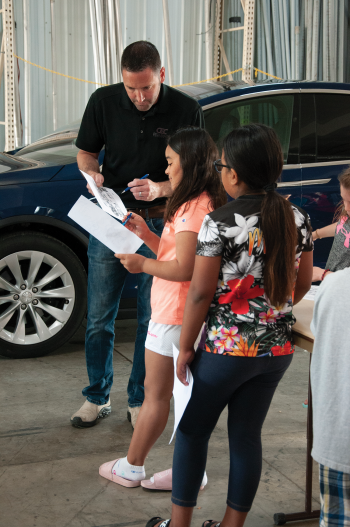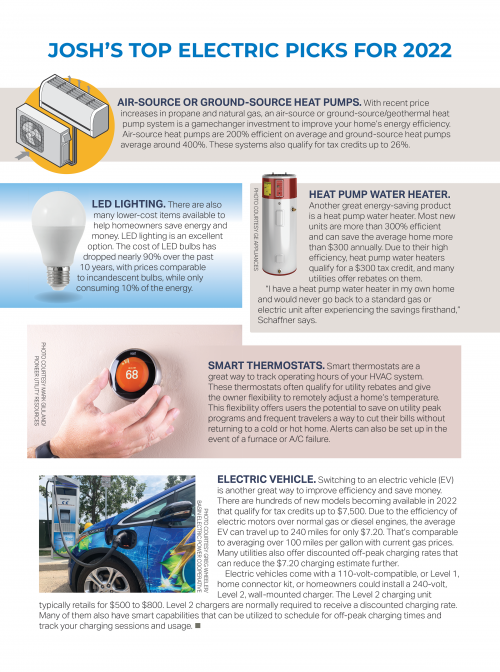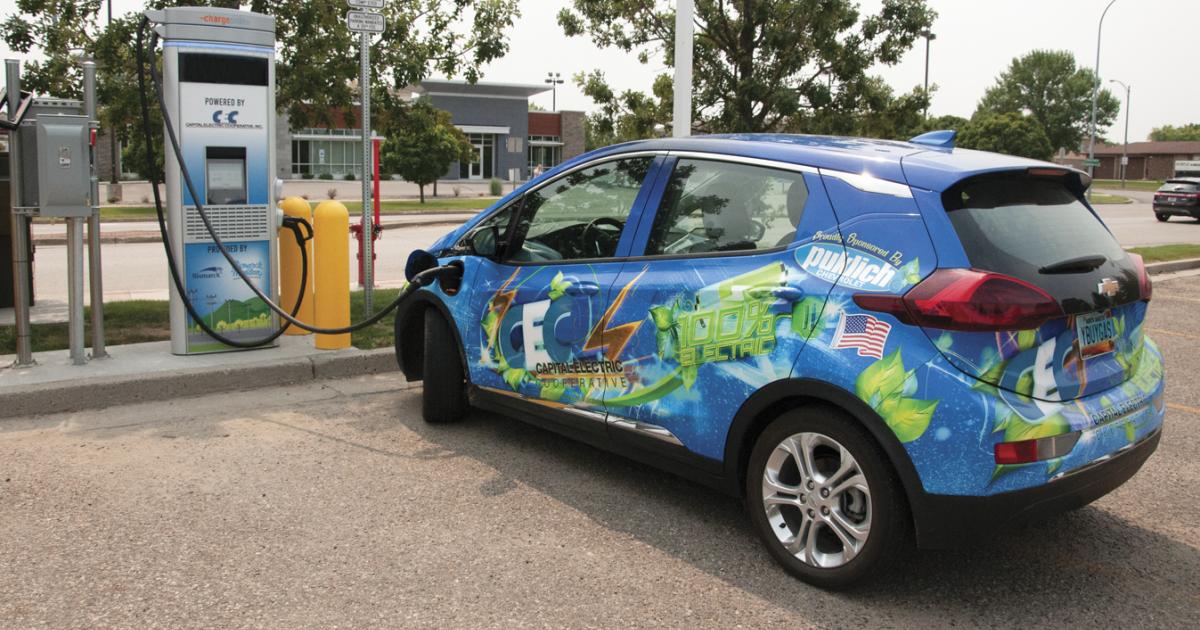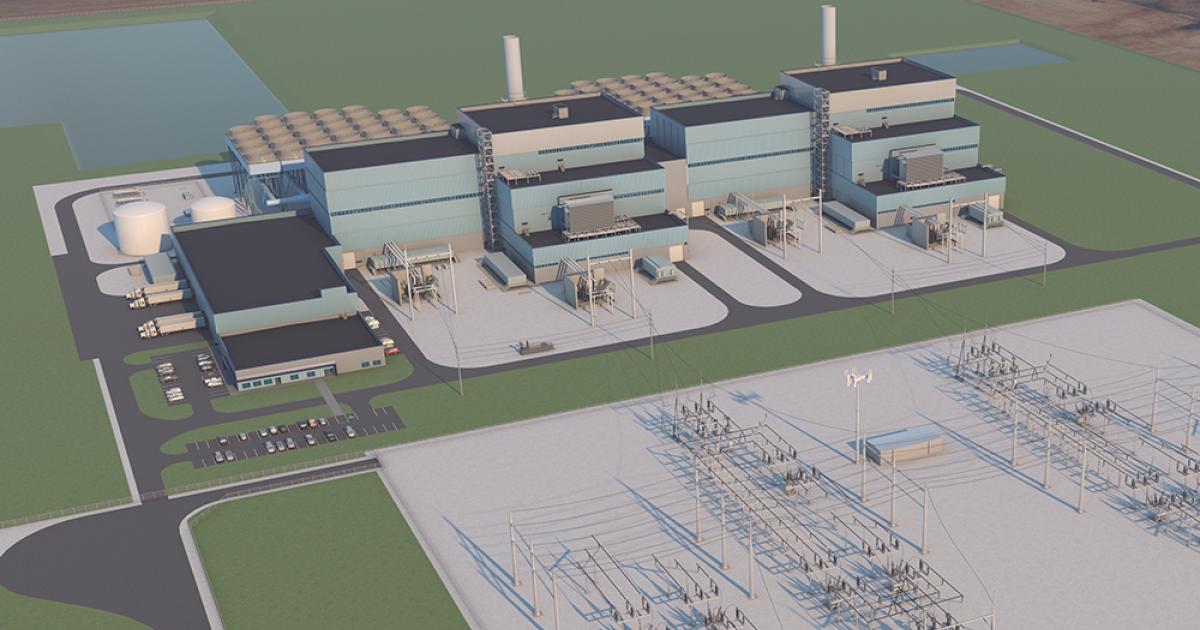Save energy and money in 2022
Capital Electric Cooperative First Leased Its Electric Vehicle, a Chevy Bolt, in 2015 to Better Understand the Technology for Its Members. Photo Courtesy Greg Wheeler/basin Electric Power Cooperative
Why should I care about my energy footprint?
Energy keeps us comfortable in our homes, and our monthly electric bill is the associated cost for this energy use. Your energy footprint not only affects your wallet, but your local electric cooperative, too.
A kilowatt-hour (kWh) is a measure of how much energy you’re using. Despite the name, 1 kWh is the amount of energy you’d use if you kept a 1,000-watt appliance running for an hour, not the number of kilowatts you’re using per hour.
Most of your cooperative’s power cost may be based on when kilowatt-hours are used rather than how many are used.
Let’s consider a July day that reaches over 100 degrees. The average co-op member returns home after work, turns down the temperature on the thermostat, starts making dinner and possibly begins a load of laundry. This home is now carrying a larger electric load, which can strain the equipment serving the home. When you aggregate the thousands of homes acting similarly at the same time, the electric grid can become strained. These times of the day are commonly referred to as peak demand periods.
During peak demand periods, extra power generation may be brought “online,” or added to the electric system, for only a few hours. This up-and-down cycle of electricity production requires careful planning and comes at a cost to utilities and cooperative members.
Local electric cooperatives are committed to providing affordable, reliable and safe electricity to members in all weather conditions, at all times of the day. As a member, you can help by considering your own energy footprint.
Ultimately, caring about and working to improve your energy footprint can result in savings on your electric bill, lower costs to your local electric cooperative and a more reliable electric grid.
Members are encouraged to reach out to their local electric cooperative with questions about their electric bill or use, or if they are considering installing electric technologies, including solar systems, generators or electric vehicles. Your cooperative can provide guidance on the best products, reliable contractors, potential rebates and rate options that may benefit the membership.

CO-OP Q&A WITH AN ENERGY SERVICES EXPERT
Josh Schaffner, energy services manager for Capital Electric Cooperative in Bismarck, has spent the last 15 years helping co-op members become more energy efficient. Schaffner assists members with an array of electric product installations, provides energy education to cooperative members and the public, and even consults on energy services projects for other cooperatives. His expertise in renewable energy has taken him to projects in Dubai, Alaska and throughout North Dakota.
Q What does it mean to be energy-efficient?
The basic idea of energy efficiency is simple – use less energy to do the same amount of work, which can save you money on your electric bills. To make energy-saving measures work in your home, it comes down to preventing energy waste while maintaining personal comfort in your home.
Q In your experience, what are the common “energy thieves” in a home?
A common energy thief we see is a recirculating pump installed with a water heater. These pumps are used to circulate hot water throughout the home, so the homeowner doesn’t need to run the faucet while waiting for water to get hot. They can be an excellent way to save water if used properly, but if allowed to circulate 24/7, the result is a lot of wasted energy.
To explain, as the pump circulates water throughout the home, the water cools. When enough cool water returns to the water heater, it needs to be reheated. This process can cause water to be reheated multiple times per hour, resulting in large amounts of energy being used without a benefit to the homeowner, especially in the overnight hours. The effect is the same, whether the water heater is gas, propane or electric.
We recommend installing a programmable timer for the pump to remedy this issue, which allows homeowners to set times they expect to be using water. The timers only cost $7.
Other common energy thieves are improperly sealed windows or doors. Check the weatherstripping on doors and windows and replace, if needed. Make sure doors and windows are properly latched, especially in winter. Remove window A/C units and store them during winter.
A good way to test your seal is hold a tissue near windows or doors on windy winter days. If you feel cold air or see the tissue move, there is a good chance your home would benefit from improved weatherstripping or a sealing mechanism on that window or door.
Q What technologies have electric cooperatives deployed in recent years that have transformed, or will transform, the industry?
Electric cooperatives are focused on a safe and reliable energy future for our members.
At Capital Electric Cooperative, we are considering and reviewing drone equipment to use for line inspection, battery storage options for outage management and peak power output, and smart controls for load-management programs.
In recent years, we have invested in new metering technology, a solar pasture well program and an off-peak electric vehicle (EV) charging program. These products and programs allow the cooperative to offer multiple rate options to our members. On top of that, electric cooperatives invest heavily in cybersecurity.
The basic idea of energy efficiency is simple – use less energy to do the same amount of work, which can save you money on your electric bills. To make energy-saving measures work in your home, it comes down to preventing energy waste while maintaining personal comfort in your home.
A common energy thief we see is a recirculating pump installed with a water heater. These pumps are used to circulate hot water throughout the home, so the homeowner doesn’t need to run the faucet while waiting for water to get hot. They can be an excellent way to save water if used properly, but if allowed to circulate 24/7, the result is a lot of wasted energy.
To explain, as the pump circulates water throughout the home, the water cools. When enough cool water returns to the water heater, it needs to be reheated. This process can cause water to be reheated multiple times per hour, resulting in large amounts of energy being used without a benefit to the homeowner, especially in the overnight hours. The effect is the same, whether the water heater is gas, propane or electric.
We recommend installing a programmable timer for the pump to remedy this issue, which allows homeowners to set times they expect to be using water. The timers only cost $7.
Other common energy thieves are improperly sealed windows or doors. Check the weatherstripping on doors and windows and replace, if needed. Make sure doors and windows are properly latched, especially in winter. Remove window A/C units and store them during winter.
A good way to test your seal is hold a tissue near windows or doors on windy winter days. If you feel cold air or see the tissue move, there is a good chance your home would benefit from improved weatherstripping or a sealing mechanism on that window or door.
Electric cooperatives are focused on a safe and reliable energy future for our members.
At Capital Electric Cooperative, we are considering and reviewing drone equipment to use for line inspection, battery storage options for outage management and peak power output, and smart controls for load-management programs.
In recent years, we have invested in new metering technology, a solar pasture well program and an off-peak electric vehicle (EV) charging program. These products and programs allow the cooperative to offer multiple rate options to our members. On top of that, electric cooperatives invest heavily in cybersecurity.











